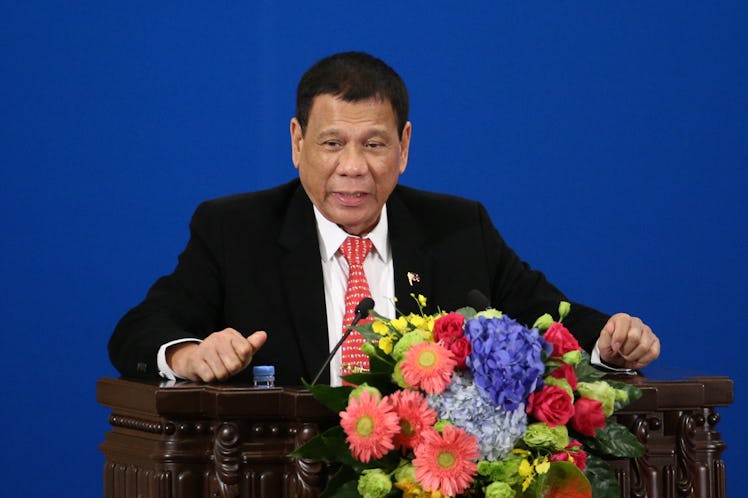
This Is Why Trump's Relationship With The Philippines President Is So Controversial
This upcoming Sunday, Nov. 12, President Donald Trump is scheduled to land in Manila, capital of the Philippines, where he will attend a celebration for the 50th anniversary of the Association of Southeast Asian Nations (ASEAN). That will be followed by a summit celebration of the 40th anniversary of U.S.-ASEAN relations. On this leg of his Asia trip, the president is expected to rub elbows with Philippine President Rodrigo Duterte, in what might be one of the more controversial meetings between Trump and another leader yet. To explain the potential for controversy requires explaining something else, though: Who is Rodrigo Duterte, exactly?
Rodrigo Duterte was elected president of the Phillipines in May 2016, and assumed office at the end of the following month. Many of Duterte's actions have prompted negative headlines in the past — such as his fiery rhetoric during his presidential campaign and his contentious relationship with administration of former President Barack Obama.
However, no policy stands out more during Duterte's 16-month tenure than his aggressive drug war, which has been criticized as a brutal crusade full of human rights abuses. In August, estimates from police in the Philippines indicated that nearly 4,000 people have died as a result of the drug war, per The Atlantic. However, the president is accused of many more thousands of deaths while allegedly allowing police to commit murder lawlessly.
Ahead of their meeting in Vietnam, Duterte has already warned President Trump that the topic of human rights shouldn't even be brought up.
"You want to ask a question, I’ll give you an answer," Duterte told reporters on Wednesday, Nov. 8. "Lay off. That is not your business. That is my business. I take care of my country and I will nurture my country to health."
One of the more brutal accounts from the Philippines occurred in mid-August, when a 17-year-old high school student was killed by police. On that occasion, police said the boy, Kian delos Santos, fired at them while fleeing a drug operation, which prompted officers to fire back. Video surveillance contradicts that account, however, with footage having shown the boy being dragged, the Washington Post reports.
"The apparent willingness of Philippine police to deliberately target children for execution marks an appalling new level of depravity in this so-called drug war," Phelim Kine, the deputy Asia director for Human Rights Watch, told the Post. "These killings demonstrate that Duterte’s rejection of the rule of law has made all Filipinos potential ‘drug-war’ victims, no matter how young."
Though the murder seemed to represent a turning point in the drug war, the government provided denials of abuses a month after the killing occurred.
"It should not come as a surprise that these malignant elements would conspire to sabotage the president’s campaign to rid the Philippines of illegal drugs and criminality," said presidential spokesman Ernesto Abella, according to the Washington Post.
Duterte's Other Controversial Moments
A controversial drug war isn't Duterte's only claim to infamy. The Filipino president has had other high-profile moments that have drawn criticism. While he was campaigning to become president, the 72-year-old politician promised to issue 1,000 pardons a day to police accused of brutality, while also vowing to issue a pardon to himself at the end of his term, "for the crime of multiple murder."
Duterte has also drawn criticism for multiple jokes he's made about rape. Most recently, while speaking at a military camp on the subject of sexual, he said that he'd go to jail for those who committed assault. "I will be imprisoned for you," Duterte reportedly told soldiers. "If you rape three (women), I will say that I did it. But if you marry four, son of a whore you will be beaten up."
The comment drew the attention of Chelsea Clinton, who left no mistake what her feeling were on Duterte's comments.
In May, during a call with Duterte, Trump complimented the presidency, telling his Filipino counterpart that he was doing a "great job" fighting a drug war.